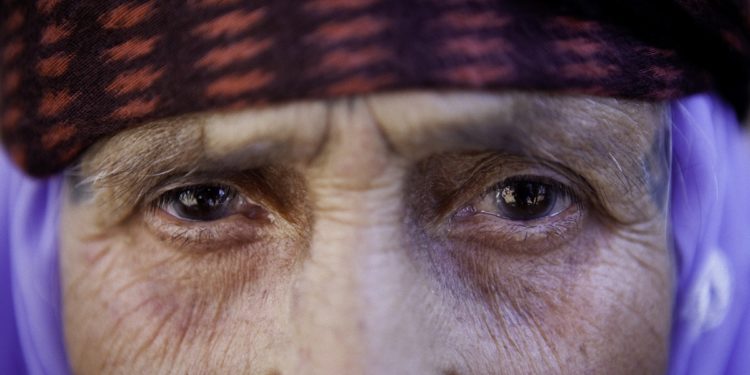The most precious thing the revolution of Rojava has granted us, without doubt, is profound comradeship. A comradeship so captivating, we are left enchanted by its narratives.
In this series, we will attempt to share our heirloom, we will shed light on the untold stories that are hidden in the humble hearts of the heroes of this liberation; our matriotic people.
We begin our series in a small house in Derik, where we are greeted by a courteous mother of 7. Upon arrival, we see the footprints of a deeply rooted serenity in the eyes of mother Asya, as we converse, we understand that the tenderness in the mother’s eyes is a reflection of her conscience: pure and content.
Mother Asya welcomes us as if she had been waiting for us to arrive home. She instantly begins to tend to us, explaining that the comrades do not have the opportunity to visit her much and our arrival is somewhat cherished.
The following hours of our brief visit are full of stories and shared memories of what life was like during the sacred war of the revolution of Rojava.
“At the beginning of this revolution, [early 90’s] with great enthusiasm and morale, we were doing whatever it takes to succeed. Everybody was doing what they could. We were going to the wheat fields to work. When it was time to harvest crops, we would come together with families whose children were fighting or working for the revolution. We would collect wheat, chickpeas, lentils, cotton for the comrades; sometimes with the big Mazda vehicles and other times by foot.
We were very enthusiastic and upbeat when we went to work. My first child was 7 months old at the time. Whoever could work in the houses would come and work, those who were older and could not work would take care of the children we brought with us.
While we were working, they were not only interested in children but they also give us morale, they would sing;
“Come on, my fathers, come on,
chop, chop,
every grain is a bullet,
we will destroy our enemy,
our friends will be victorious”
When we heard this, we became more spirited and worked more willingly. We didn’t feel like we were doing business, we would work as if had gone to a wedding with great enthusiasm, morale and excitement.
If one of the sons went to the mountains, then we would all gather and visit their homes. The family of the fighter would be the son of all of us. That family would see great value. One would give great value to the other.
At that time there was no YPG – YPJ. We never thought it would be here. We were expecting that ‘If freedom happens, it will start in the North. The guerrilla fights there and defeats the enemy.’
At that time, the mothers whose children participated in the struggle for freedom formed the group of ‘mothers of peace’. The mothers in these groups formed and quickly they resolved any problems. If there is a fight between the two families, there is something of resentment, the problem would be solved when the mothers intervened.
Guerrilla mothers have great influence. Nobody can break their words. Mothers would intervene so fast that they would solve problems without even neighbours hearing. We loved each other very much. There were no phones like now. We used to go to each other by foot. Even if it was late at night, it was mid-day, families would recover quickly.
The first periods were very difficult; we didn’t have a car to go from place to place. The influence of the regime could not easily be overcome. The comrades who would carry out work in these places would constantly pay attention to privacy. They would try many different methods and do their work without attracting anyone’s attention.
And families would protect the comrades. If the comrades had an idea or rhetoric, the families wouldn’t make the comrades repeat themselves. No matter what the word from the comrades’ mouth was said to be done; it was done.
Everyone had a lot of trust in comrades about it, and it was great love and work. Those who carried out work in those times were called “cephevi”. If a mother is said to be a ‘cephevi’, if she had a problem, for example, if she was sick, everyone would gather and go to her.
If the child of a family falls martyr, everyone would go to the family and take care of them. If they were financially poor, the other families would collect and provide financial aid among themselves. If the condition of his house was not habitable, the families would come together and the house of that family would be built.
At that time it was only adults who did this work: a culture, solidarity developed in children. At the end of the month, the children would collect the money they collected in their piggy bank and give it to the comrades for help.
In winter, mothers would come together in winter to knit woollen socks so that the comrades would not get cold in the mountains in winter. Wool socks knitted by mothers were collected and delivered to the comrades.”




